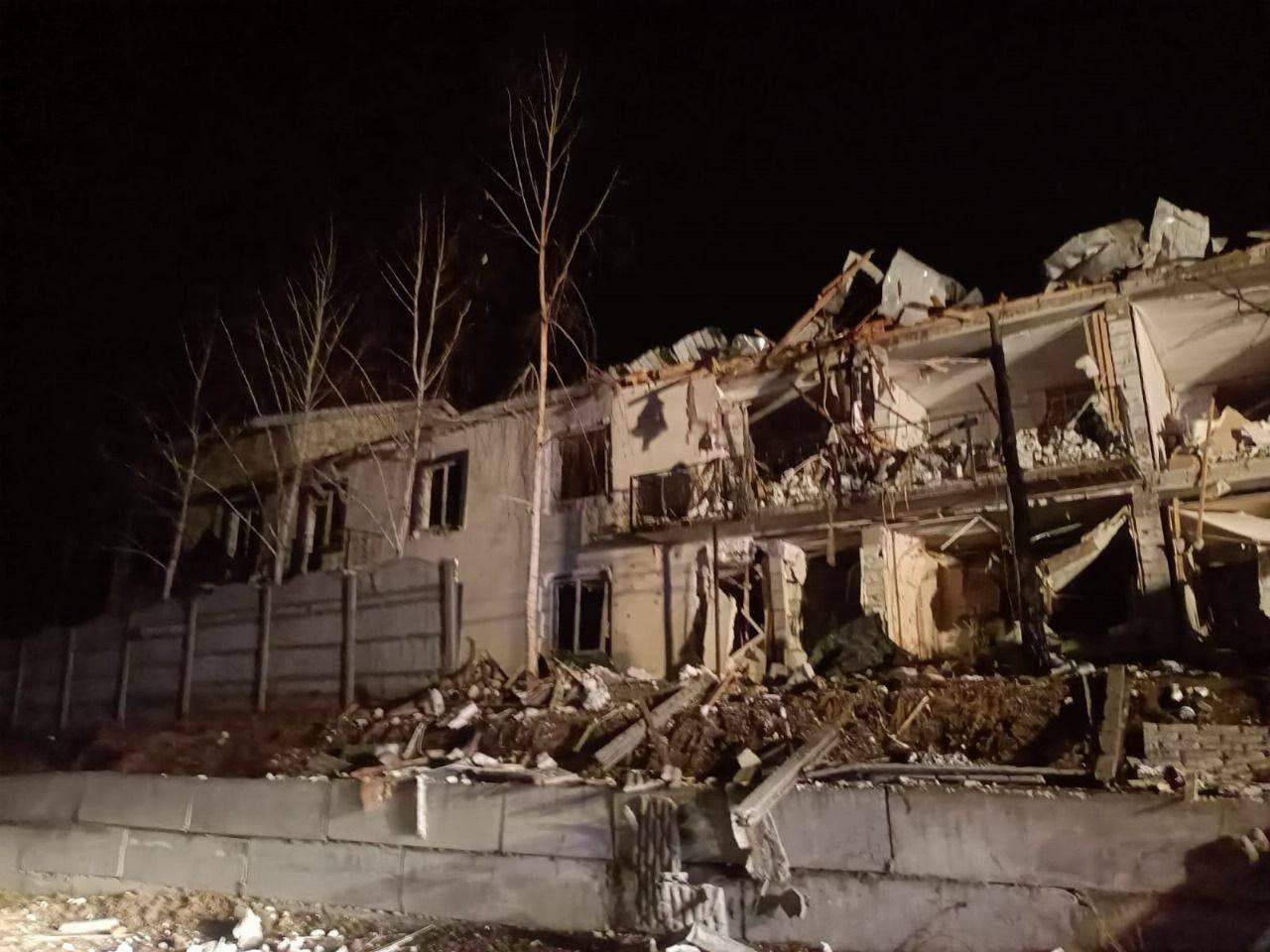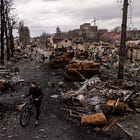What Peace?
An account of the past three months of life in Kyiv.

Regular readers of Persuasion will know the story of Kateryna Kibarova, a Ukrainian resident of the Kyiv suburb of Bucha, who has been publishing searing updates on her life in Ukraine since the Russian invasion. (You can read each installment of her writing here.)
Just after our most recent conversation, which formed the basis for the account we are publishing today, I received an email from Kateryna with a brutally simple sentence: “1 kilometer from me—the peace plan of Trump and Putin.” Attached was the image above.
– David, Executive Director
by Kateryna Kibarova
It’s very strange. Before, it was hard to guess what was coming next. Now, we don’t understand at all. It’s beyond depressing—we are in a state of panic.
Every day, something changes, and Donald Trump contradicts what he said the day before. I hadn’t appreciated before how horrible it would be—how unstable he is in his actions.
Physically, it has become very scary, because our air defense systems depend directly on American support and supplies. The Russian missiles come in waves of 200 or 300 at a time. If there are no more interceptors, our air defense will have nothing to shoot them down with. During the night, Russian missiles and Shahed suicide drones fly overhead and strike houses. Last month, one landed not too far from my building. It struck maybe a kilometer away. Windows in a building next to mine were shattered, cars were burned. You don’t know how each night is going to end.
We also feel other effects. USAID has cancelled grants for reconstruction in the area. Naturally, there are mass layoffs of employees. Three hospitals nearby, in Hostomel, were funded with U.S. support. And it’s not only construction; a number of U.S.-funded programs were implemented to support the elderly population. There were free diagnostic clinics set up with American aid. Because so many pensioners cannot afford healthcare, these types of programs were essential.
My aunt, for example, has heart problems. She frequently received a free diagnostic cardiogram at one of these centers. When I got sick, I went to a private clinic and paid 1000 hryvnias, about $25, for a doctor’s appointment. A typical visit plus prescriptions can cost $60 or $70. But a retiree’s monthly pension is only around $83. How are they supposed to make that last? Prices for care have also increased, especially with the shortage of specialists now—many women went abroad with their children, fleeing the war, and men are being taken to the front.
Everyone is exhausted from the constant anxiety and the power failures. Then there’s the stress of not being able to understand what your future will be like. The horror is overwhelming. Yet we understand perfectly well we need to gas up the car, we need to shop, we need to eat. We have to be realistic: we are ordinary people and we do not influence this situation in any major way. Our main job is to go to work, make money, donate to good causes, help our military, and try to keep ourselves mentally healthy. (But keeping mentally healthy isn’t possible—that I can tell you unequivocally.)
During the campaign, Trump was saying “I’m going to end the war in 24 hours” and “This is going to be over by early spring.” When you live as we do, you hope that when people of such stature and politicians of such status say those things, they are not throwing words to the wind. You hope that they have certain leverage, that they have a vision of the situation. We know that Vladimir Putin and Trump had a relationship going back to the 1990s. A lot of people in Ukraine believed him, and thought he could really resolve this conflict.
So when Volodymyr Zelenskyy went to Washington, everyone was very positive. Because, we thought, “They’re going to negotiate, right?” And then on Saturday morning when I woke up after the Oval Office meeting, I just didn’t understand. Looking at the circus that took place at the White House, it looked like a performance—the comments about Zelenskyy’s attire and these remarks from journalists and so on. You watch and you don’t understand.
And then you hear the questions. Did Ukraine start the war first? Did we provoke it?
I saw it all with my own eyes: the helicopters overhead, the bodies in the road. To say Ukraine incited this—I’m speechless.
My parents are in Zaporizhzhia now, and my brother is there. Frontline cities like this will be the ones we supposedly have to “give back” after the “peace talks.”
How can you trust that a crazy neighbor like the one we have won’t tear down any fence you put up, merely because he dislikes it? Putin will act as he pleases. We saw that much after the lootings, after the murders and rapes and all the atrocities. These are people who act like animals, whose word cannot be taken at face value. The Geneva Conventions don’t interest them. Russian prisoners of war are ready to do anything just to stay on the Ukrainian side. It’s because the Russians behave cruelly not only towards captured enemies but also towards their own—towards their own people, towards their own soldiers.
Many of my friends and acquaintances who had planned summer vacations changed everything because so much is unknown. Maybe they will have to leave the country, if a pro-Russian puppet government comes to power. As Ukrainian patriots, none of us will put up with a pro-Russian leader like [former Kremlin-backed president Viktor] Yanukovych.
My friends in Thailand are telling me that I should urgently delete my Facebook posts. They tell me to speak more loyally about Russians and start bowing already to the prospect of a pro-Russian government in Kyiv. That’s the kind of talk of the moment.
But these types of people have not known for a long time what Ukraine is. We’ve changed a lot in these three years. We changed, and life changed. Did I think in my 21st year, or in my 22nd year of life, that I would know how to charge a generator, start it—to know how much gas to put in it and how to change the oil? Yet this is the reality in which we now live.
In the final analysis, everyone will make their own choices because everyone has a different point of view. But it’s very strange to me to imagine how wives who lost their husbands on the front lines, or mothers of fallen soldiers, will stay here if the government falls. To imagine that they will parrot Russian propaganda—that they will say, “yes, we are Banderites”—is borderline fantastic.
We, like you, are free. We are freedom-loving people who are used to democracy and free speech. No one knows what to do next.
Our story is in limbo, and there’s no telling how it will end.
Kateryna Kibarova is a Ukrainian economist and resident of Bucha.
Translated from the Russian by Julia Sushytska and Alisa Slaughter. This transcript has been edited for concision and clarity.
About the Translators: Julia Sushytska was born in L’viv and is a Visiting Assistant Professor in Comparative Studies in Literature and Culture at Occidental College. Alisa Slaughter is Professor of Creative Writing at the University of Redlands. They recently co-edited and translated a selection of essays and lectures by Merab Mamardashvili, A Spy for an Unknown Country (ibidem-Verlag, Stuttgart, 2020).
Follow Persuasion on Twitter, LinkedIn, and YouTube to keep up with our latest articles, podcasts, and events, as well as updates from excellent writers across our network.
And, to receive pieces like this in your inbox and support our work, subscribe below:



It is terrible, but it is not the responsibility of the US.